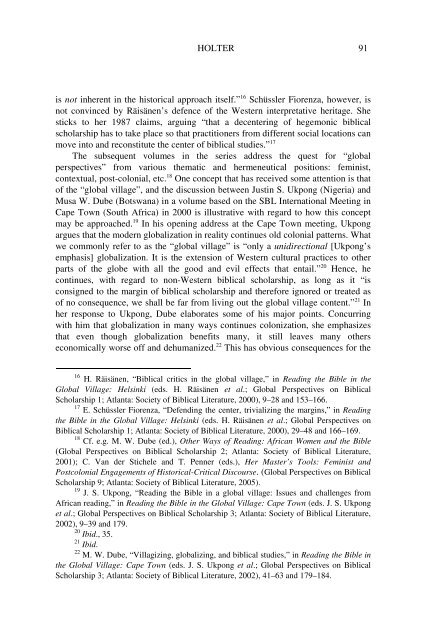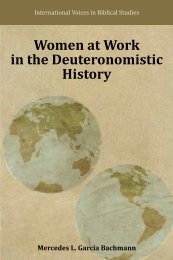Global Hermeneutics? - International Voices in Biblical Studies ...
Global Hermeneutics? - International Voices in Biblical Studies ...
Global Hermeneutics? - International Voices in Biblical Studies ...
Create successful ePaper yourself
Turn your PDF publications into a flip-book with our unique Google optimized e-Paper software.
HOLTER 91<br />
is not <strong>in</strong>herent <strong>in</strong> the historical approach itself.” 16 Schüssler Fiorenza, however, is<br />
not conv<strong>in</strong>ced by Räisänen’s defence of the Western <strong>in</strong>terpretative heritage. She<br />
sticks to her 1987 claims, argu<strong>in</strong>g “that a decenter<strong>in</strong>g of hegemonic biblical<br />
scholarship has to take place so that practitioners from different social locations can<br />
move <strong>in</strong>to and reconstitute the center of biblical studies.” 17<br />
The subsequent volumes <strong>in</strong> the series address the quest for “global<br />
perspectives” from various thematic and hermeneutical positions: fem<strong>in</strong>ist,<br />
contextual, post-colonial, etc. 18 One concept that has received some attention is that<br />
of the “global village”, and the discussion between Just<strong>in</strong> S. Ukpong (Nigeria) and<br />
Musa W. Dube (Botswana) <strong>in</strong> a volume based on the SBL <strong>International</strong> Meet<strong>in</strong>g <strong>in</strong><br />
Cape Town (South Africa) <strong>in</strong> 2000 is illustrative with regard to how this concept<br />
may be approached. 19 In his open<strong>in</strong>g address at the Cape Town meet<strong>in</strong>g, Ukpong<br />
argues that the modern globalization <strong>in</strong> reality cont<strong>in</strong>ues old colonial patterns. What<br />
we commonly refer to as the “global village” is “only a unidirectional [Ukpong’s<br />
emphasis] globalization. It is the extension of Western cultural practices to other<br />
parts of the globe with all the good and evil effects that entail.” 20 Hence, he<br />
cont<strong>in</strong>ues, with regard to non-Western biblical scholarship, as long as it “is<br />
consigned to the marg<strong>in</strong> of biblical scholarship and therefore ignored or treated as<br />
of no consequence, we shall be far from liv<strong>in</strong>g out the global village content.” 21 In<br />
her response to Ukpong, Dube elaborates some of his major po<strong>in</strong>ts. Concurr<strong>in</strong>g<br />
with him that globalization <strong>in</strong> many ways cont<strong>in</strong>ues colonization, she emphasizes<br />
that even though globalization benefits many, it still leaves many others<br />
economically worse off and dehumanized. 22 This has obvious consequences for the<br />
16<br />
H. Räisänen, “<strong>Biblical</strong> critics <strong>in</strong> the global village,” <strong>in</strong> Read<strong>in</strong>g the Bible <strong>in</strong> the<br />
<strong>Global</strong> Village: Hels<strong>in</strong>ki (eds. H. Räisänen et al.; <strong>Global</strong> Perspectives on <strong>Biblical</strong><br />
Scholarship 1; Atlanta: Society of <strong>Biblical</strong> Literature, 2000), 9–28 and 153–166.<br />
17<br />
E. Schüssler Fiorenza, “Defend<strong>in</strong>g the center, trivializ<strong>in</strong>g the marg<strong>in</strong>s,” <strong>in</strong> Read<strong>in</strong>g<br />
the Bible <strong>in</strong> the <strong>Global</strong> Village: Hels<strong>in</strong>ki (eds. H. Räisänen et al.; <strong>Global</strong> Perspectives on<br />
<strong>Biblical</strong> Scholarship 1; Atlanta: Society of <strong>Biblical</strong> Literature, 2000), 29–48 and 166–169.<br />
18<br />
Cf. e.g. M. W. Dube (ed.), Other Ways of Read<strong>in</strong>g: African Women and the Bible<br />
(<strong>Global</strong> Perspectives on <strong>Biblical</strong> Scholarship 2; Atlanta: Society of <strong>Biblical</strong> Literature,<br />
2001); C. Van der Stichele and T. Penner (eds.), Her Master’s Tools: Fem<strong>in</strong>ist and<br />
Postcolonial Engagements of Historical-Critical Discourse. (<strong>Global</strong> Perspectives on <strong>Biblical</strong><br />
Scholarship 9; Atlanta: Society of <strong>Biblical</strong> Literature, 2005).<br />
19<br />
J. S. Ukpong, “Read<strong>in</strong>g the Bible <strong>in</strong> a global village: Issues and challenges from<br />
African read<strong>in</strong>g,” <strong>in</strong> Read<strong>in</strong>g the Bible <strong>in</strong> the <strong>Global</strong> Village: Cape Town (eds. J. S. Ukpong<br />
et al.; <strong>Global</strong> Perspectives on <strong>Biblical</strong> Scholarship 3; Atlanta: Society of <strong>Biblical</strong> Literature,<br />
2002), 9–39 and 179.<br />
20<br />
Ibid., 35.<br />
21<br />
Ibid.<br />
22<br />
M. W. Dube, “Villagiz<strong>in</strong>g, globaliz<strong>in</strong>g, and biblical studies,” <strong>in</strong> Read<strong>in</strong>g the Bible <strong>in</strong><br />
the <strong>Global</strong> Village: Cape Town (eds. J. S. Ukpong et al.; <strong>Global</strong> Perspectives on <strong>Biblical</strong><br />
Scholarship 3; Atlanta: Society of <strong>Biblical</strong> Literature, 2002), 41–63 and 179–184.




